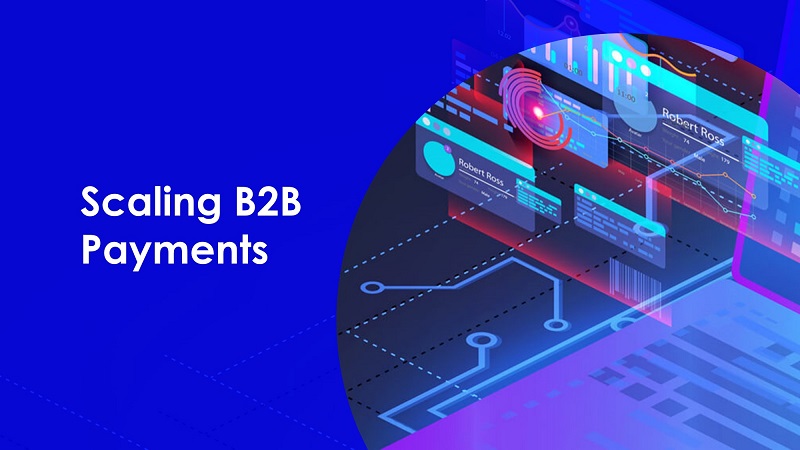The B2B payments landscape has traditionally been dominated by manual, slow, and expensive processes involving checks, wire transfers, and bank-driven payment networks. As business needs evolve, the demand for faster, more efficient, and scalable payment solutions has grown exponentially. FinTechs are playing a crucial role in transforming and scaling B2B payments by offering innovative, tech-driven solutions that address the limitations of traditional payment systems. Through the use of automation, artificial intelligence (AI), blockchain, and cloud-based infrastructure, FinTechs are enabling businesses to streamline payments, enhance transparency, and reduce operational costs.
1. Automating Payments and Reducing Costs
One of the primary contributions of FinTechs to B2B payments is the automation of payment processes. Traditional B2B payments often involve manual invoicing, reconciliation, and approvals, which can lead to errors, delays, and higher costs. FinTech solutions simplify these processes by automating the entire payments workflow, from invoicing to reconciliation.
- Accounts Payable (AP) Automation: FinTechs offer AP automation tools that allow businesses to streamline invoice management, approvals, and payment execution. Solutions like Tipalti and AvidXchange automate manual tasks, enabling faster payments and minimizing the risk of human error.
- Cost Efficiency: By reducing the reliance on manual intervention, FinTechs help businesses cut down on administrative costs associated with processing payments, managing invoices, and resolving payment disputes. Automation also allows businesses to manage high volumes of payments without needing to expand their workforce.
Impact: Automation enhances payment efficiency, reduces processing times, and lowers costs, making B2B payments scalable as businesses grow. This allows companies to focus on strategic tasks instead of administrative burdens.
2. Enabling Real-Time and Cross-Border Payments
Traditional B2B payments, especially cross-border transactions, often face delays and high fees due to intermediaries, currency conversion costs, and time-zone differences. FinTechs are addressing these issues by enabling real-time payments and simplifying cross-border transactions through the use of innovative technologies.
- Real-Time Payments: FinTechs are integrating with faster payment networks and developing solutions that enable real-time payments for businesses. Platforms like Dwolla and Stripe offer real-time processing for domestic and international transactions, improving cash flow for businesses.
- Cross-Border Payments and Currency Management: FinTechs such as TransferWise (Wise) and Airwallex provide businesses with solutions for cross-border payments at lower fees, allowing them to transfer funds in multiple currencies without relying on traditional banking networks. These platforms use local clearing systems to reduce the complexity and cost of international payments.
Impact: Real-time and cross-border payments increase liquidity for businesses by accelerating cash flow, reducing payment delays, and enabling them to operate seamlessly in global markets. This is particularly crucial for industries that rely on just-in-time inventory or fast-paced trade cycles.
3. Enhancing Transparency and Security through Blockchain
Blockchain technology is transforming the B2B payments landscape by enabling secure, transparent, and immutable payment processes. FinTechs are leveraging blockchain to create decentralized networks that eliminate intermediaries, reduce transaction costs, and ensure data integrity.
- Smart Contracts: FinTechs use smart contracts on blockchain platforms to automate payments once predefined conditions are met. For instance, in supply chain transactions, smart contracts can release payments automatically when goods are delivered and verified, reducing payment delays and ensuring contract compliance.
- Immutable Record-Keeping: Blockchain’s distributed ledger technology ensures that all transactions are recorded transparently and cannot be altered, providing an audit trail for all payments. This enhances trust between B2B partners, reduces disputes, and ensures compliance with regulatory requirements.
- Fraud Prevention: Blockchain reduces the risk of fraud in B2B payments by verifying and authenticating transactions through decentralized networks, making it more difficult for malicious actors to tamper with payment data or steal funds.
Impact: By enhancing transparency, security, and efficiency, blockchain technology enables businesses to scale B2B payments without the risks associated with traditional payment systems. This is particularly beneficial for industries that deal with complex, high-value transactions or have a high risk of fraud.
4. Facilitating Digital Wallets and Embedded Payments
FinTechs are driving innovation in digital wallets and embedded payments, providing businesses with flexible and seamless payment experiences. Digital wallets allow businesses to store funds digitally and make instant payments to suppliers, vendors, and partners, while embedded payments integrate payment functionality directly into business platforms.
- Digital Wallets: Platforms like Payoneer and Veem enable businesses to manage multiple currencies in digital wallets, making it easier to send and receive payments globally without incurring high conversion fees or delays. These wallets also offer instant payments, allowing businesses to complete transactions faster.
- Embedded Payments: Embedded payments allow businesses to integrate payment processing directly into their enterprise resource planning (ERP) systems, e-commerce platforms, or supply chain software. FinTechs like Stripe and Square provide APIs that allow businesses to embed payment solutions directly into their workflows, enabling seamless payment execution.
Impact: Digital wallets and embedded payments streamline B2B transactions by eliminating the need for separate payment processes. This improves the user experience for businesses, reduces friction, and accelerates the payment lifecycle.
5. Providing Access to Alternative Financing Options
FinTechs are expanding access to alternative financing for businesses, helping them manage cash flow and working capital more effectively. Traditional financing solutions often involve lengthy approval processes and rigid criteria, whereas FinTech platforms offer faster, more flexible options.
- Invoice Financing: FinTechs such as Fundbox and BlueVine offer invoice financing solutions, allowing businesses to access funds by selling their outstanding invoices. This gives businesses quicker access to cash that would otherwise be tied up in unpaid invoices, improving liquidity.
- Supply Chain Financing: FinTech platforms like C2FO provide supply chain financing options that allow suppliers to get paid earlier by offering discounts to buyers in exchange for early payment. This improves the financial health of suppliers while giving buyers more flexible payment terms.
- BNPL for B2B: The Buy Now, Pay Later (BNPL) model, which has been popular in the consumer space, is being extended to B2B payments. FinTechs like Resolve offer BNPL solutions that allow businesses to pay for goods and services over time, improving cash flow management without incurring debt.
Impact: By providing alternative financing solutions, FinTechs are giving businesses more control over their cash flow and reducing their reliance on traditional bank loans. This helps businesses grow and scale by ensuring they have the capital they need to operate efficiently.
6. Improving Payment Reconciliation and Integration
B2B payments are often complicated by the need for reconciliation between invoices, payments, and accounts. FinTechs are improving reconciliation processes by offering integrated payment platforms that automatically match invoices with payments and streamline the entire reconciliation workflow.
- Integrated Payment Solutions: Platforms like Bill.com and Coupa integrate directly with accounting and ERP systems, automatically reconciling payments with invoices and updating financial records in real time. This reduces the need for manual reconciliation and ensures that businesses always have accurate, up-to-date financial data.
- Real-Time Data Synchronization: By syncing payments with accounting software in real time, FinTech platforms enable businesses to track their cash flow, manage outstanding invoices, and ensure that payments are made on time. This helps prevent errors and improves financial planning.
Impact: Automated reconciliation reduces errors, speeds up financial closing processes, and provides greater visibility into the financial health of the business. This is particularly important for scaling businesses that need to manage complex financial workflows with high transaction volumes.
7. Enhancing User Experience and Customization
FinTechs focus heavily on user experience (UX), providing businesses with intuitive, easy-to-use interfaces that simplify complex payment processes. By offering customizable payment solutions, FinTechs allow businesses to tailor their payment systems to fit their specific needs.
- Custom Dashboards and Reporting: FinTech platforms offer customizable dashboards that give businesses a holistic view of their payment activity, including real-time analytics, cash flow reports, and transaction history. This allows businesses to make data-driven decisions and optimize their payment processes.
- Multi-Channel Payment Support: FinTechs provide support for multiple payment methods, including ACH transfers, credit cards, wire transfers, and digital wallets, allowing businesses to offer flexible payment options to their partners and suppliers.
Impact: By prioritizing user experience and customization, FinTechs help businesses manage payments more effectively and offer tailored solutions that meet the unique requirements of different industries and markets.
8. Enabling Regulatory Compliance and Fraud Prevention
Compliance with regulations such as anti-money laundering (AML) and know your customer (KYC) laws is critical in B2B payments. FinTechs are using AI, machine learning, and automation to streamline compliance processes and prevent fraud in real time.
- Automated Compliance Checks: FinTech platforms automate KYC/AML checks during onboarding and payments processing, ensuring that businesses comply with regulations without manual intervention. This reduces the risk of fines and penalties for non-compliance.
- Fraud Detection and Prevention: AI-driven fraud detection tools monitor transactions for suspicious activity, such as unusual payment patterns or discrepancies in payment details. This allows FinTechs to prevent fraud before it occurs, protecting businesses from financial losses.
Impact: By enabling automated compliance and fraud prevention, FinTechs provide businesses with peace of mind, allowing them to scale their payment operations securely and efficiently.
FinTechs are playing a pivotal role in scaling B2B payments innovation by introducing automated, real-time, and secure payment solutions that address the pain points of traditional payment systems. Through automation, blockchain, digital wallets, and alternative financing, FinTechs are enabling businesses to streamline operations, improve cash flow, and enhance transparency in payment processes. As FinTech continues to evolve, businesses can expect even more innovative solutions that further simplify and optimize B2B payments, driving efficiency, scalability, and global competitiveness.










